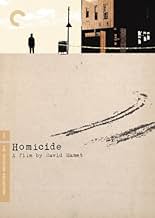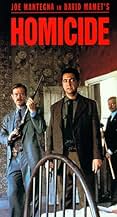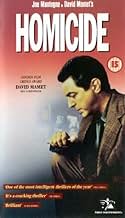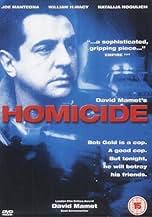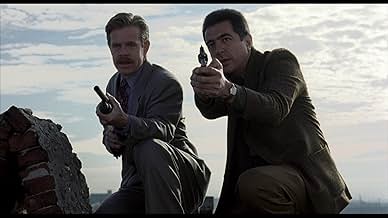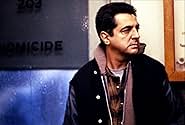Homicide
- 1991
- Tous publics
- 1h 42min
NOTE IMDb
6,9/10
8,7 k
MA NOTE
Ajouter une intrigue dans votre langueA Jewish homicide detective investigates a seemingly minor murder and falls in with a Zionist group as a result.A Jewish homicide detective investigates a seemingly minor murder and falls in with a Zionist group as a result.A Jewish homicide detective investigates a seemingly minor murder and falls in with a Zionist group as a result.
- Réalisation
- Scénario
- Casting principal
- Récompenses
- 3 victoires et 6 nominations au total
Avis à la une
While this picture could compare favorably with many of its type for nothing more than its use of action, suspense and realistic details regarding police work, it goes significantly further and becomes a character study of a man searching for an identity. A conscientious, no-nonsense detective, Gold has never become involved in his work to the extent that it has made him question his values, let alone his reason for existing. Without the point being forced upon us, we see a character with (seemingly) no home, no friends, no social activities: a decent man who has not connected with anything meaningful in life until circumstances force him to make significant choices.
Especially challenging to the viewer is the deliberately ambiguous ending in which there is reason to believe that Gold could choose either of the major alternatives available to him. He looks and feels like an outsider in the precinct. He now identifies with the Jew as an outsider. Could it be that he is actually considering.....?
See this provocative picture, and decide for yourself. Excellent performances and direction throughout.
Especially challenging to the viewer is the deliberately ambiguous ending in which there is reason to believe that Gold could choose either of the major alternatives available to him. He looks and feels like an outsider in the precinct. He now identifies with the Jew as an outsider. Could it be that he is actually considering.....?
See this provocative picture, and decide for yourself. Excellent performances and direction throughout.
Give me Joe Mantegna and William H. Macy as partners and I'll guarantee that there will be a movie worth watching. Macy has been moving up the chain, and is brilliant here.
The whole issue of Jewish persecution is woven in the story, and Mantegna is conflicted because he is Jewish, but obviously not a practicing one. As things go, his Jewishness is challenged by the investigation. "You say you are a Jew, and you can't read Hebrew. What are you then?" He is finally confronted with the reality of hate and his role as a cop takes second place to his Jewishness.
It is about realizing that he is nowhere until he finds out who he really is. The language of the police is raw and brings everything out into the open. Detective Gold (Mantegna) doesn't find himself at the end of the film. He has a ways to go, but now he has a direction.
The whole issue of Jewish persecution is woven in the story, and Mantegna is conflicted because he is Jewish, but obviously not a practicing one. As things go, his Jewishness is challenged by the investigation. "You say you are a Jew, and you can't read Hebrew. What are you then?" He is finally confronted with the reality of hate and his role as a cop takes second place to his Jewishness.
It is about realizing that he is nowhere until he finds out who he really is. The language of the police is raw and brings everything out into the open. Detective Gold (Mantegna) doesn't find himself at the end of the film. He has a ways to go, but now he has a direction.
I found the film as riveting and disturbing as most of the other reviewers, but I'd like to comment here on David Mamet's writing style. As one of the earlier reviews points out, Mamet is much admired by the literati, and as another says, he is studied in film schools. So I may be going out on a limb, but I am a lot less impressed with his writing than most.
David Mamet started as a playwright, and he still writes with the theater in mind, even when he writes for movies or TV. I first noticed this a year or so ago when watching a rerun of Hill Street Blues for which he'd written the script. The show had many first-rate TV writers, and there was nothing incongruous in the idea that a celebrated playwright would write an episode. But his episode, while intense, involving, and philosophical in the approved Mamet style, proved out of place as an episode in a long-running series with established characters. Mamet's Hill Street bunch lost familiar character traits and gained others common to nearly all the dramatis personae of his plays. The cops all talked like Mamet characters, had macho-philosophical Mamet dialogues, faced Mamet moments of truth.
Well, here is Homicide, another cop show in full length movie form, and once again his puppets talk like Mamet characters, rather than like distinguishable individuals. These roles are his own creations, so he isn't confronted with a series-watcher's expectations, but that hasn't made them more believable as people. His dialogue has a sameness about it that suggests he doesn't really listen to the way people talk. (Again, I realize this is a minority view: critics are always writing about the "gritty realism" of his characters' speeches.)
Listen to the dialogue from one of the NYPD Blue episodes written by David Milch. (I choose Milch not only because he's one of Blue's best writers [and co-producer, of course] but also because he wrote many of the best Hill Street Blues episodes around the time Mamet wrote his contribution.) The characters are varied, and their choice of words tells the listener more about them as individuals with every line they speak. Mamet characters tend to tell you, not what they are like as people, but what Mamet wants you to think about them. Again and again during Homicide I found myself thinking: "no, he wouldn't say that", or even "does anybody really talk that way?"
Am I saying David Milch is a better writer than David Mamet? I think I am, for realistic media like TV and film, anyway. The theater, as an inherently artifical medium, can absorb and even thrive upon artificiality in its dialogue. But TV and movies have different demands, and I don't think David Mamet meets them very well.
David Mamet started as a playwright, and he still writes with the theater in mind, even when he writes for movies or TV. I first noticed this a year or so ago when watching a rerun of Hill Street Blues for which he'd written the script. The show had many first-rate TV writers, and there was nothing incongruous in the idea that a celebrated playwright would write an episode. But his episode, while intense, involving, and philosophical in the approved Mamet style, proved out of place as an episode in a long-running series with established characters. Mamet's Hill Street bunch lost familiar character traits and gained others common to nearly all the dramatis personae of his plays. The cops all talked like Mamet characters, had macho-philosophical Mamet dialogues, faced Mamet moments of truth.
Well, here is Homicide, another cop show in full length movie form, and once again his puppets talk like Mamet characters, rather than like distinguishable individuals. These roles are his own creations, so he isn't confronted with a series-watcher's expectations, but that hasn't made them more believable as people. His dialogue has a sameness about it that suggests he doesn't really listen to the way people talk. (Again, I realize this is a minority view: critics are always writing about the "gritty realism" of his characters' speeches.)
Listen to the dialogue from one of the NYPD Blue episodes written by David Milch. (I choose Milch not only because he's one of Blue's best writers [and co-producer, of course] but also because he wrote many of the best Hill Street Blues episodes around the time Mamet wrote his contribution.) The characters are varied, and their choice of words tells the listener more about them as individuals with every line they speak. Mamet characters tend to tell you, not what they are like as people, but what Mamet wants you to think about them. Again and again during Homicide I found myself thinking: "no, he wouldn't say that", or even "does anybody really talk that way?"
Am I saying David Milch is a better writer than David Mamet? I think I am, for realistic media like TV and film, anyway. The theater, as an inherently artifical medium, can absorb and even thrive upon artificiality in its dialogue. But TV and movies have different demands, and I don't think David Mamet meets them very well.
I am a huge fan of Mamet and there's an excellent cast - even the mighty Roger Deakins as DOP. But this movie doesn't work. The dialogue is stilted and forced - surely the last thing you'd expect from a Mamet script - the main character is weak and not credible as a detective. The plot is all over the place and the ending highly unsatisfactory.
Not that I thought Joe was incapable of acting, but it's a little hard to take a guy seriously after seeing them in junk like "Baby's Day Out." Nevertheless, he gives a wonderful performance in this very intriguing film that was written and directed by "The Spanish Prisoner's" David Mamet.
Like "The Spanish Prisoner", "Homicide" is a movie that must be paid attention to at all times or you will miss tiny, but very important details. I will admit that I missed a few of these details, but since I watched it in a film class, we discussed it the next day and other people pointed them out. Anyway, this style of work seems to be David Mamet's "signature" and I think it's great. I hope he wins an award some day.
Getting back to the movie, besides containing numerous small details, "Homicide" is a genuinely interesting story about a Jewish cop who has gotten out of touch with his religious side. It is only after he is assigned to a case involving a murdered Jewish woman, does he finally began to get in touch with his roots. Of course there is struggle, not to mention people who do not appear to be what they seemed. It's a good movie, though a little hard to get into at first, but don't let your mind wonder, or you could be missing a vital element to the plot.
Like "The Spanish Prisoner", "Homicide" is a movie that must be paid attention to at all times or you will miss tiny, but very important details. I will admit that I missed a few of these details, but since I watched it in a film class, we discussed it the next day and other people pointed them out. Anyway, this style of work seems to be David Mamet's "signature" and I think it's great. I hope he wins an award some day.
Getting back to the movie, besides containing numerous small details, "Homicide" is a genuinely interesting story about a Jewish cop who has gotten out of touch with his religious side. It is only after he is assigned to a case involving a murdered Jewish woman, does he finally began to get in touch with his roots. Of course there is struggle, not to mention people who do not appear to be what they seemed. It's a good movie, though a little hard to get into at first, but don't let your mind wonder, or you could be missing a vital element to the plot.
Le saviez-vous
- AnecdotesThe film began as an adaptation of David Mamet's friend William J. Caunitz's 1986 novel "Suspects". However, the more Mamet wrote, the more his story diverged from the source material until, with Caunitz's blessing, Mamet left the source book behind entirely, until ultimately the script became an original screenplay.
- GaffesWhen Detective Gold discovers the photo behind the picture, in the picture is a Hebrew sign referring to a road being built by the Labor Federation's (haHistadrut) Solel Boneh division. In the sign it's misspelled "Vistadrut - Solel Bono".
- Citations
Tim Sullivan: Bob, I'm gonna tell you what the old whore said, and this is the truest thing I know: "When you start cumming with the customers, it's time to quit."
Meilleurs choix
Connectez-vous pour évaluer et suivre la liste de favoris afin de recevoir des recommandations personnalisées
- How long is Homicide?Alimenté par Alexa
Détails
Box-office
- Montant brut aux États-Unis et au Canada
- 2 971 661 $US
- Week-end de sortie aux États-Unis et au Canada
- 43 650 $US
- 14 oct. 1991
- Montant brut mondial
- 2 971 661 $US
Contribuer à cette page
Suggérer une modification ou ajouter du contenu manquant



